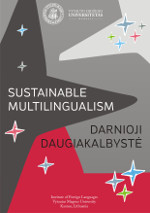CONFORTER UNE IDENTITE CARIBEENNE TRILINGUE POUR UNE PARTICIPATION ACCRUE AU MARCHE ECONOMIQUE MONDIAL: LEGITIMER L’APPRENTISSAGE DES LANGUES COLONIALES DANS LES ETATS POST-COLONIAUX CARIBEENS
FOSTERING A CARIBBEAN TRILINGUAL IDENTITY FOR ENHANCED PARTICIPATION IN THE GLOBALISED ECONOMIC MARKET: LEGITIMISING COLONIAL LANGUAGE TEACHING IN THE POST-COLONIAL CARIBBEAN STATES
Author(s): Béatrice Boufoy-Bastick Subject(s): Applied Linguistics, Sociolinguistics
Published by: Vytauto Didžiojo Universitetas
Keywords: plurilingualism;linguistic identities;linguistic policy;postcolonial states;globalisation;
Summary/Abstract: Language learning objectives have drastically changed in recent decades, shifting from a liberal arts educational perspective to the achievement of essentially three utilitarian purposes: (i) trade globalisation through English, (ii) the rise of supranational organisations advocating equity of national languages and (iii) cultural identity affirmation expressed through vernacular language recognition and use. These three socio-political intentions all combine to reconceptualise the language teachers’ mission and impose a societal responsibility to integrate and articulate all three in classroom teaching practices. Such is the complexity of the role assigned to language teachers by culturally diverse Caribbean multi-ethnic postcolonial nations upon whom it is incumbent to strengthen social cohesion within their borders through (re)valuing local creoles, while contradictorily supporting their regional integration through learning the international languages of the Caribbean (French, English and Spanish) and potentiating global economic integration through proficiency in the world lingua franca (English). In other words, language teachers are expected to fulfil a complex and potentially contradictory educational tri-dimensional social, political and economic mission. This is namely (a) ‘social’ by affirming the local Creole as an approved socio-linguistic identity marker, (b) ‘political’ by authenticating the international colonial language as the inalienable tie to the former privileged colonial power and (c) ‘economic’ by shaping a trilingual regional identity as an internationally recognised Caribbean poised for enhanced participation in the global world market.
Journal: Darnioji daugiakalbystė
- Issue Year: 2016
- Issue No: 8
- Page Range: 14-30
- Page Count: 17
- Language: French

